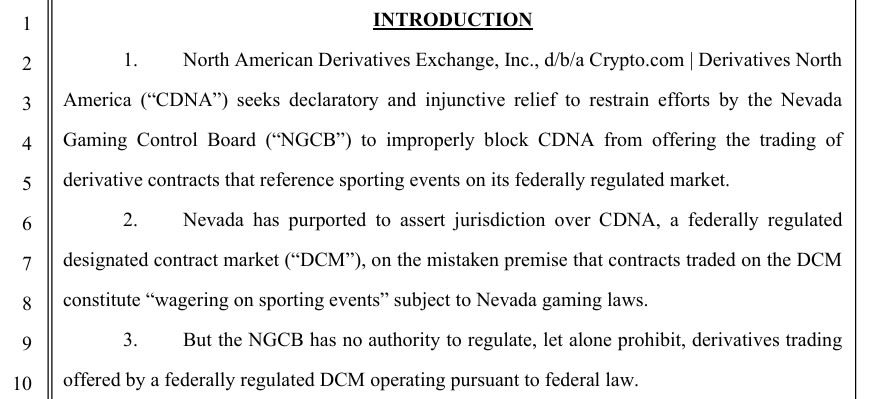Crypto.com Sues Nevada Gaming Board Over Sports Derivatives Block: A Fight for Regulatory Clarity
The derivatives arm of crypto exchange Crypto.com has sued the Nevada gaming and gambling regulator over its restriction on the trading of sporting event contracts.
North American Derivatives Exchange, Inc., which does business as Crypto.com’s North American derivatives business, sued the Nevada Gaming Control Board (NGCB) in the state’s federal court on June 3, claiming it improperly blocked the exchange from offering “derivative contracts that reference sporting events on its federally regulated market.”
It claimed the regulator asserted jurisdiction with the “mistaken premise” that contracts traded on the exchange constitute “wagering on sporting events” subject to Nevada gaming laws.
Crypto.com argued that federal law, specifically the Commodity Exchange Act, grants the Commodity Futures Trading Commission exclusive jurisdiction over these types of financial instruments.
“NGCB has no authority to regulate, let alone prohibit, derivatives trading offered by a federally regulated DCM [designated contract market] operating pursuant to federal law,” it claimed.

It cited two recent federal injunctions involving predictions marketplace KalshiEX, where courts ruled that state gaming authorities in Nevada and New Jersey could not regulate federally approved event contracts.
The courts ruled that the Commodity Exchange Act preempts state law and that the CFTC has exclusive authority.
“Federal courts have consistently recognized that the CFTC’s regulation of the national derivatives market is exclusive and preempts state involvement,” Crypto.com argued.
According to the complaint, the NGCB sent Crypto.com a cease-and-desist letter on May 20 that threatened criminal and civil penalties unless the exchange stopped offering its sports event contracts to Nevada residents.
The firm asserts that its sports derivatives contracts are certified and permitted under federal law, state interference causes “irreparable harm” to its business, and it cannot feasibly comply with Nevada’s demands, such as geo-fencing users, without violating federal rules requiring impartial access.
“It could not possibly comply with Nevada gaming regulations and the CFTC’s core principle of impartial, not location-based, access,” it stated.
The firm is seeking a permanent injunction stopping Nevada from enforcing its gaming laws and a declaratory judgment affirming federal preemption.
CFTC probed Super Bowl contracts
In February, the CFTC investigated derivatives contracts tied to the Super Bowl that Crypto.com and Kalashi offered.
“We firmly believe in the legality of our events contracts and believe the CFTC is the appropriate regulator to bring federally regulated market integrity, manipulation controls, and product availability in all 50 states,” Crypto.com told Cointelegraph at the time.
In March, Kalshi filed a similar lawsuit against the NGCB and the New Jersey Division of Gaming Enforcement, after it received cease-and-desist orders from both regulators directing the company to halt all sports contracts.
Quick Summary of the News
- Crypto.com’s North American Derivatives Exchange (Nadex) is suing the Nevada Gaming Control Board (NGCB).
- The lawsuit contests the NGCB’s attempt to block Crypto.com from offering sports-related derivative contracts in Nevada.
- Crypto.com argues that these derivatives fall under the exclusive jurisdiction of the Commodity Futures Trading Commission (CFTC).
- NGCB sent a cease-and-desist letter threatening penalties if Crypto.com continued offering these contracts.
- This follows similar actions against KalshiEX, another platform offering prediction markets, which also faced regulatory pushback.
Why It Matters
This lawsuit is significant because it highlights the jurisdictional ambiguity surrounding crypto derivatives, particularly those linked to events like sports. The core issue is whether these contracts should be classified as gambling (and therefore regulated by state gaming boards) or as financial instruments (under the CFTC’s purview). A ruling in favor of Crypto.com could set a precedent, reinforcing the CFTC’s authority over these products and potentially opening the door for wider adoption of crypto-based prediction markets and event-based derivatives.
Conversely, a ruling against Crypto.com could empower state regulators to impose stricter controls on crypto derivatives, potentially fragmenting the market and hindering innovation. This outcome could force platforms to navigate a complex web of state-level regulations, increasing compliance costs and limiting accessibility for users.
Market Impact
While the immediate market impact may be limited, the long-term implications are substantial.
Consider this potential impact:
| Scenario | Potential Impact on Crypto Derivatives Market |
|---|---|
| Crypto.com wins | Increased confidence in CFTC oversight; potential for greater adoption of event-based crypto derivatives. Positive for platforms like Crypto.com and Kalshi. |
| Crypto.com loses | Increased regulatory uncertainty; potential for state-by-state restrictions on crypto derivatives. Negative for platforms; increased compliance burden. |
Expert Take or Personal Insight
The Nevada Gaming Control Board’s stance seems short-sighted. Innovation in financial markets is inevitable, and attempting to stifle it through regulatory overreach is rarely effective. The CFTC has the expertise to regulate these products appropriately, ensuring market integrity and protecting consumers. State-level regulation risks creating a patchwork of rules that stifle innovation and drive activity underground. Furthermore, the fact that two federal injunctions involving prediction marketplace KalshiEX shows where the law stands.
Actionable Insight
Traders and investors should closely monitor this case, as the outcome could influence the regulatory landscape for crypto derivatives. Keep an eye on any court filings or statements from the CFTC. If you’re involved in trading crypto derivatives, be prepared for potential changes in accessibility depending on the ruling. Platforms that offer sports-related derivatives should prepare for increased compliance costs if state regulations become more prevalent.
Conclusion
The Crypto.com lawsuit against the Nevada Gaming Control Board is a crucial battleground in the ongoing struggle for regulatory clarity in the crypto space. The outcome will have significant implications for the future of crypto derivatives and the balance of power between federal and state regulators. As the case progresses, it will be imperative to follow the developments closely and adapt strategies accordingly.